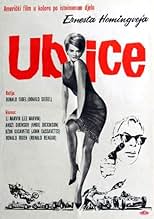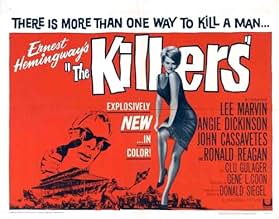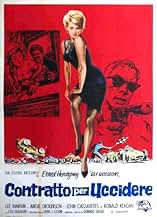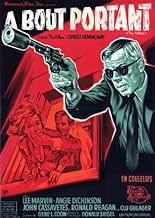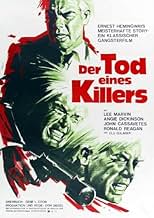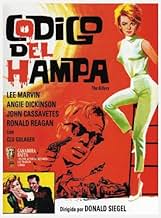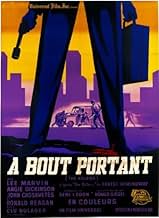Surprised that their contract victim didn't try to run away from them, two professional hit men try to find out who hired them and why.Surprised that their contract victim didn't try to run away from them, two professional hit men try to find out who hired them and why.Surprised that their contract victim didn't try to run away from them, two professional hit men try to find out who hired them and why.
- Won 1 BAFTA Award
- 1 win & 1 nomination total
Irvin Mosley Jr.
- Mail Truck Guard
- (as Irvin Mosley)
- Director
- Writers
- All cast & crew
- Production, box office & more at IMDbPro
Featured reviews
Under the title Ernest Hemingway's The Killers, Don Siegel's 1964 movie shows no more fidelity to the short story from which it takes its name and a fraction of its plot than Robert Siodmak's 1946 masterpiece, The Killers. And though it borrowed from the earlier movie its flashback structure (substantially simplified) and much of the backstory written for it, it's not quite a remake, either: the changes strike too deep.
A pair of contract hit-men track down a victim who seems ready, almost eager, to die. The killers this time around are Lee Marvin and Clu Gallagher, whose cozy arrangements suggest something of Fante and Mingo in The Big Combo. The first big shift from its 1946 predecessor is that Marvin's curiosity, not an insurance investigator's, sets the plot in motion, by his delving into the target's past and the whereabouts of a million dollars from a heist years before (in fact, he becomes the principal character). The second is a racheted-up level of violence: The movie opens with the pair tracking down their prey in a school for the blind, whose residents they ruthlessly terrorize during their hunt. And the level stays high.
John Cassavettes plays the victim, a former race-car driver fallen on hard times since a bad smash-up. Through the reminiscences of old buddy Claude Akins and past associate Norman Fell, we relive his racing career to an extent that stretches of the movie look like outtakes from Grand Prix. In those glory days he crossed tracks with the femme fatale of the piece, Angie Dickinson (in her rat-pack, late-Camelot salad days herself). After his car crash and their break-up, she lures him off the primrose path to serve as driver during a mail-truck robbery.
But Dickinson's heart belongs to daddy daddy in this instance being Ronald Reagan as a heavy. This marks his last film role. For a while it was chic to dismiss Reagan as a lousy actor, but he was always compentent enough. The puzzle is that the undeniable charisma that helped garner him the governorship of California and the presidency of the United States never came through on the screen; he couldn't carry a picture. He has a nasty moment slapping Dickinson silly when her attention strays to Cassavettes, but Marvin redeems his top billing by stealing the movie.
Ernest Hemingway's The Killers remains a good example of how the complexities and suggestiveness of the noir cycle were to metamorphose into a faster, flatter, more literal and brutal style of moviemaking starting in the late 1950s. Don Siegel was in the forefront of this change, starting in period noirs (The Verdict) but reaching his apogee, so to speak, in Dirty Harry. He delivers the goods, pronto, in a plain brown wrapper.
A pair of contract hit-men track down a victim who seems ready, almost eager, to die. The killers this time around are Lee Marvin and Clu Gallagher, whose cozy arrangements suggest something of Fante and Mingo in The Big Combo. The first big shift from its 1946 predecessor is that Marvin's curiosity, not an insurance investigator's, sets the plot in motion, by his delving into the target's past and the whereabouts of a million dollars from a heist years before (in fact, he becomes the principal character). The second is a racheted-up level of violence: The movie opens with the pair tracking down their prey in a school for the blind, whose residents they ruthlessly terrorize during their hunt. And the level stays high.
John Cassavettes plays the victim, a former race-car driver fallen on hard times since a bad smash-up. Through the reminiscences of old buddy Claude Akins and past associate Norman Fell, we relive his racing career to an extent that stretches of the movie look like outtakes from Grand Prix. In those glory days he crossed tracks with the femme fatale of the piece, Angie Dickinson (in her rat-pack, late-Camelot salad days herself). After his car crash and their break-up, she lures him off the primrose path to serve as driver during a mail-truck robbery.
But Dickinson's heart belongs to daddy daddy in this instance being Ronald Reagan as a heavy. This marks his last film role. For a while it was chic to dismiss Reagan as a lousy actor, but he was always compentent enough. The puzzle is that the undeniable charisma that helped garner him the governorship of California and the presidency of the United States never came through on the screen; he couldn't carry a picture. He has a nasty moment slapping Dickinson silly when her attention strays to Cassavettes, but Marvin redeems his top billing by stealing the movie.
Ernest Hemingway's The Killers remains a good example of how the complexities and suggestiveness of the noir cycle were to metamorphose into a faster, flatter, more literal and brutal style of moviemaking starting in the late 1950s. Don Siegel was in the forefront of this change, starting in period noirs (The Verdict) but reaching his apogee, so to speak, in Dirty Harry. He delivers the goods, pronto, in a plain brown wrapper.
This remake of the classic film with the same name (1946) by Robert Siodmak deals with two hired killers (Lee Marvin , Clu Gulager in similar role to William Conrad and Charles McGraw) who murder a man (John Cassavetes replacing Burt Lancaster) at a blind school . The cold-bloody assassins look into his past and by means flashbacks , attempting to solve leads as to why their victim calmly waits for his death and find tracks to a 100.000 dollars robbery . The gunmen discovering his involvement with crime boss (Ronald Reagan , alike role Alfred Dekkker ) and the gangster's moll (Angie Dickinson in the character of Ava Gardner).
This noir film packs action , thrills, suspense, tension , thundering drama and a mighty punch in some exciting scenes . It's loosely based very vaguely on a short story by Ernest Hemingway and originally pretended for television but exhibited to the cinemas due a its lots of violence . This thrilling story with intricate argument plenty of turns and twists , revolves around two assassins revealing surprise after surprise . Noteworthy portrayals come from menacing Ronald Reagan as a racketeer in his last movie, and of course Lee Marvin and Clu Gulager give towering performances as the gunfighters . There's also a magnificent action from John Cassavetes in the pivotal role and Angie Dickinson as gorgeous Femme Fatale and shooting to stardom in one of his first films . Atmospheric musical score by John Williams , subsequently famous as composer of Steven Spielberg films . Rating : Better than average . It's a good film that ensures the nervous intrigue never lets up from the first moment and realized in efficient style by Donald Siegel , then at the peak of his Hollywood career and future author of Charly Varrick, Coogan's bluff and Dirty Harry and sequels. Well worth watching .
This noir film packs action , thrills, suspense, tension , thundering drama and a mighty punch in some exciting scenes . It's loosely based very vaguely on a short story by Ernest Hemingway and originally pretended for television but exhibited to the cinemas due a its lots of violence . This thrilling story with intricate argument plenty of turns and twists , revolves around two assassins revealing surprise after surprise . Noteworthy portrayals come from menacing Ronald Reagan as a racketeer in his last movie, and of course Lee Marvin and Clu Gulager give towering performances as the gunfighters . There's also a magnificent action from John Cassavetes in the pivotal role and Angie Dickinson as gorgeous Femme Fatale and shooting to stardom in one of his first films . Atmospheric musical score by John Williams , subsequently famous as composer of Steven Spielberg films . Rating : Better than average . It's a good film that ensures the nervous intrigue never lets up from the first moment and realized in efficient style by Donald Siegel , then at the peak of his Hollywood career and future author of Charly Varrick, Coogan's bluff and Dirty Harry and sequels. Well worth watching .
The Killers is directed by Don Siegel and adapted to screenplay by Gene L. Coon from the short story written by Ernest Hemmingway. It stars Lee Marvin, Angie Dickinson, Clu Gulager, John Cassavetes, Ronald Reagan and Claude Akins. Music is by John Williams and cinematography by Richard L. Rawlings.
Hit men Charlie (Marvin) and Lee (Gulager) enter a school for the blind and gun down motor mechanic teacher Johnny North (Cassavetes). He doesn't resist. Why? This question bothers Charlie and he sets about finding out...
It's difficult when reading the name The Killers to not think of the 1946 film made by Robert Siodmak, a film that is revered as one of the quintessential movies of film noir. But Don Siegel's film, a re-jigging of the plot, is well worthy of consideration as quintessential neo-noir.
Originally slated to be the first made for TV movie as part of a new era for movies on television, the film was pulled by NBC for being too violent. With the film also featuring a murder by sniper scene, the recent assassination of John F. Kennedy by sniper ensured The Killers was temporarily on unsafe ground. With Ronald Reagan making his last appearance on film before moving into politics, unusually playing a villain no less, the 64 version of The Killers has a bit of history.
It's a film about double-crossing, murder and fateful yearnings, featuring amoral characters in a wonderfully constructed story that is told in flashbacks! Photographed in bright, almost garish, colours, it's very much the polar opposite to Siodmak's version, well visually at least, but it is very effective and striking, almost enhancing the lurid nature of Coon's screenplay. It's an aggressive film where the violence packs a punch, and the ending has a considerable black heart.
The cast are mostly effective. Marvin and Gulager's hit-man pairing are deliberately off kilter in terms of personality, and it's these two that propel the movie forward (well backwards really). Cassavetes makes interesting work as live wire dupe Johnny, Akins does good as a pal watching on helplessly as Johnny loses his life footings and Dickinson sizzles as she fatalises the femme. Weak link is Reagan, who looks ill at ease playing a tough villain type. It's no surprise to learn later on down the line that he wasn't very fond of the role.
Good quality neo-noir crafted by a man who knew how to do the real deal back in the day. 7.5/10
Hit men Charlie (Marvin) and Lee (Gulager) enter a school for the blind and gun down motor mechanic teacher Johnny North (Cassavetes). He doesn't resist. Why? This question bothers Charlie and he sets about finding out...
It's difficult when reading the name The Killers to not think of the 1946 film made by Robert Siodmak, a film that is revered as one of the quintessential movies of film noir. But Don Siegel's film, a re-jigging of the plot, is well worthy of consideration as quintessential neo-noir.
Originally slated to be the first made for TV movie as part of a new era for movies on television, the film was pulled by NBC for being too violent. With the film also featuring a murder by sniper scene, the recent assassination of John F. Kennedy by sniper ensured The Killers was temporarily on unsafe ground. With Ronald Reagan making his last appearance on film before moving into politics, unusually playing a villain no less, the 64 version of The Killers has a bit of history.
It's a film about double-crossing, murder and fateful yearnings, featuring amoral characters in a wonderfully constructed story that is told in flashbacks! Photographed in bright, almost garish, colours, it's very much the polar opposite to Siodmak's version, well visually at least, but it is very effective and striking, almost enhancing the lurid nature of Coon's screenplay. It's an aggressive film where the violence packs a punch, and the ending has a considerable black heart.
The cast are mostly effective. Marvin and Gulager's hit-man pairing are deliberately off kilter in terms of personality, and it's these two that propel the movie forward (well backwards really). Cassavetes makes interesting work as live wire dupe Johnny, Akins does good as a pal watching on helplessly as Johnny loses his life footings and Dickinson sizzles as she fatalises the femme. Weak link is Reagan, who looks ill at ease playing a tough villain type. It's no surprise to learn later on down the line that he wasn't very fond of the role.
Good quality neo-noir crafted by a man who knew how to do the real deal back in the day. 7.5/10
I recently saw this at the 2008 Palm Springs Film Noir Festival. Not really Film Noir as it was made after the genre had passed and is in color and features no detectives or private eyes and not even a film as it was originally intended as the very first made-for-television movie. Produced by Universal's Revue Studios it was deemed too violent for television. It of course isn't too violent by today's standards and NBC censors did call for revisions of the movie and since there are only a few questionable scenes It could have been easily done but they left it as was and it didn't make it's May of 1964 television premier. Instead it went to theaters and drive ins in July of 1964. Long-time film and television director Don Siegel directs. His most noted work would still come late in his career with Clint Eastwood in "Coogan's Bluff", "Two Mules for Sister Sara", "The Beguiled", "Dirty Harry" and "Escape From Acatraz" and John Wayne in "The Shootist" and Charles Bronson in "Telefon." This film is as different from the 1946 film as that film is as different from the short story by Earnest Hemingway that both film borrow from. The 1946 film is noted for being Burt Lancaster's first film role and the 1964 film is noted for being Ronald Reagan's last film role. Seasoned hit-man Charlie Storm (Lee Marvin) and young enforcer sidekick Lee (Clu Gulager) have been hired for larger than usual fee to knock off a retired professional race car driver who now teaches shop class in a school for the blind. A series of flashbacks tell the story of Johnny North (John Cassavetes) and his mechanic Earl Sylvester (Claude Akins) and the femme fatale Sheila Farr (Angie Dickenson) who comes into their lives. Sheila is the kept woman of mobster Jack Browning (Ronald Reagan) whose gang includes Mickey Farmer (Norma Fell) and George Flemming (Robert Phillips). Also in the cast are a couple of familiar and wonderful character television actors in small support roles with Kathleen O'Malley and Burt Mustin. Music score by John Williams when he was a contract composer before he made it big the film also features a Henry Mancini song "Too Little Time" with an on screen performance by jazz singer Nancy Wilson. Screenplay adaptation by Gene L. Cook and director Siegel this deserves a look especially from it's great cast and historical perspective. It keeps flowing pretty smoothly and never bogs down. Cassavetes seems uncomfortable in the role and their really isn't much on screen chemistry between he and Dickenson but Dickenson is delicious as the femme fatale and Marvin and Gulager, especially Gulager's smooth wit, are great as the hit team. Angie Dickenson was on hand at the screening for an audience Q&A following the film and it was great to see her. I liked this and would give this an 7.5 out of 10.
Director Don Siegel's "The Killers" is very loosely based on the Hemingway short story with few similarities. Two killers (Lee Marvin and Clu Gulager)complete an easy hit-for-hire but wonder why their victim, although warned in advance, didn't run away from them. After piecing together some information, they realize that the $25,000 they got for the hit is a drop in the bucket compared to a missing million dollar stash of stolen loot. After questioning a few "witnesses" they discover that the man they killed had been double-crossed and had lost his will to live. Throw in Angie Dickinson as a two-timing temptress and Ronald Reagan (of all people) as a nasty double-dealing henchman and you've got one violent movie without any good guys in sight. Marvin and Gulager are excellent as the hit men and John Cassavettes is also great as their hapless and resigned victim. Reagan, who supposedly regretted his turn here as a villian, is surprising effective. It was the only time in his career he played a "bad guy". Angie Dickinson, of course, is no mere window-dressing. She gives everyone a run for their money as the best-looking devious dame on the planet. "The Killers", which was originally made for TV, but released in theatres instead due to its violent subject matter, is a one-of-a-kind early 60's film noir. It may have little to do with Hemingway's story, but I'm sure "Papa" would have enjoyed it anyway.
Did you know
- TriviaAccording to Don Siegel, it was the policy at Universal at the time to shoot the last scene of the film first. On that first day of filming, according to Siegel and Clu Gulager, Lee Marvin arrived late and had been drinking, but because he had no dialogue, the scenes were used as shot.
- GoofsAt the start of the race, Johnny presses the accelerator to the floorboard with his right foot. However, his left foot is nowhere near the clutch. In a manual transmission, the clutch would need to be released while simultaneously accelerating.
- Quotes
Charlie Strom: Lady, I don't have the time.
- Crazy creditsThe style of the film's credits reflects its original made-for-TV origins: in 1960s TV movies, Stars, Co-stars, and Featured Players were listed only in the opening credits, while supporting players were listed only in the closing credits.
- ConnectionsFeatured in Biography: Angie Dickinson: Tinseltown's Classiest Broad (1999)
- SoundtracksToo Little Time
Music by Henry Mancini
Lyrics by Don Raye
Sung by Nancy Wilson
[Johnny and Sheila dance to the song performed at the nightclub]
Details
Box office
- Budget
- $750,000 (estimated)
- Gross worldwide
- $9,261
- Runtime
- 1h 33m(93 min)
- Color
- Aspect ratio
- 1.85 : 1
Contribute to this page
Suggest an edit or add missing content


